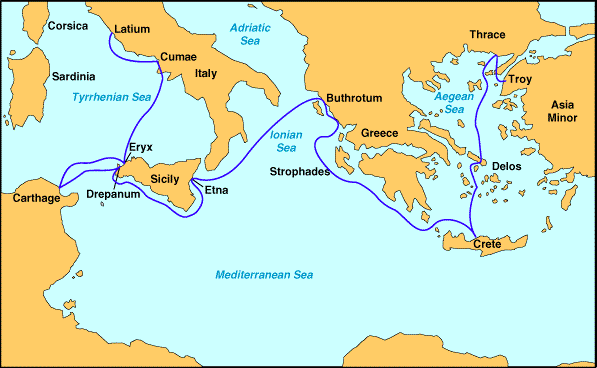Mythology
Delahoyde
VIRGIL'S
AENEID:
BOOK I
"Arma virumque cano" -- "I sing of warfare and a man...." So begins
Virgil, self-consciously placing his epic in the tradition of Homer's
works. The "warfare" should remind one of the Iliad and the "man"
the Odyssey. Linguistically, Latin relies on word endings to
determine grammatical function, so there's a wide latitude for placement
of the words without obscuring the meaning. Virgil takes advantage of
this linguistic feature to take us from "Troiae," the fourth word in the
sentence, all the way to "Roma," the last word in a long first sentence
which therefore mirrors Aeneas' journey.

Aeneas' Journey
Virgil adheres to epic conventions in calling on the Muse (1.13f),
stating his theme, and beginning in medias res. (We'll backtrack
in Book II to fill in the blanks.) A slight variation registers in that
he asks the Muse not to tell the story but to explain the reasons the
divine powers allow suffering (Aeneas' in this case).
The existence of Carthage is an anachronism in this epic, not founded for
several centuries until after these events, but Carthage was Rome's rival
for Mediterranean supremacy, so its function in the tale is politically
symbolic.
Some questions for now and eventually:
- Why does Juno (formerly Hera) want to undermine Aeneas' potential
success?
- Between the Greek ideals expressed in Homer's Iliad and the
Roman ideals expressed in Virgil's Aeneid, what do we gain and
what do we lose?
- Compared to Virgil, Homer seems not to take sides in the Trojan War.
Virgil is promoting Roman glory, and tracing it back to Troy. So what
happens in an epic when the poet takes sides? Does this backfire in some
ways? And what was Homer's purpose instead?
Virgil: Introduction
Aeneid: Book 2
Aeneid: Book 4
Aeneid: Book 6
Orpheus

